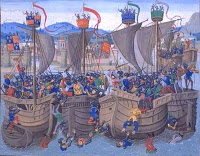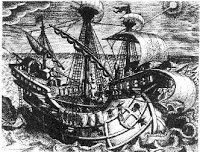I’ve been wrestling with naval rules for Adventures Dark and Deep for the last three weeks. And I can confidently say that all naval rules that have been devised for D&D or its various incarnations have either been way too complex, way too abstract, or way too awful. Neither of which is necessarily mutually exclusive.
The AD&D DMG is just terrible in its treatment of ships. It’s a seemingly random collection of tables strung together with not much of anything except a common header, an emphasis on the minutae of how long it takes a large barge to reach normal speed from a standstill, and no real treatment of what the players themselves will be doing on a ship in the first place.
2nd Edition’s “Of Ships and the Sea”, and 3.x’s “Stormwrack” go even further. There’s plenty of delving into the differences between tropical, sub-tropical, arctic, etc. encounters, and new classes, feats, kits, etc. to allow players to specialize in all things nautical, but I wonder if any of that actually got used outside of a specifically sea-based campaign (if then). I’m not interested in the undersea sections of either book, because I think the current section in the Adventures Dark and Deep GMT does a pretty good job without getting into minutiae.
The D&D Expert Set takes us in the opposite direction. It takes up only two printed pages at the end of the Expert rulebook, but in those pages we manage to learn about siege weapons on board ship, a straight-percentage table on evading encounters, wind (*plus* an optional system of “simple rules” which is longer than the table it replaces), and stats on 11 types of ships.
I’ve been pouring through all of these sources and more, and getting more and more frustrated. The same way I was frustrated with pouring through the sources on castles and armies, and then realizing that nobody was using those rules anyway, so why kill myself over them? Characters are on ships a lot more than they build castles, so I should turn my attention there.
And it struck me tonight that I was doing the same thing with ships. Nobody is using AD&D to simulate detailed combat between ships, or cares what the wind is like every 6 hours of a 4 month journey. Characters on ships do three (non-mutually exclusive) things:
1) They use ships to move from place to place
2) They use ships as encounter locales just like buildings or dungeons
3) The ships they are on get into hostile situations
The first two write themselves. How fast does it take to get from point A to point B, what sort of random encounters do they have, and what are the chances of getting lost? Just like any wilderness. The third gets done just like normal combat, but written for ships; there are some limited combat actions, a couple of tables of combat resolution (that work between ships as well as between ships and sea monsters) and voila! Each individual type of ship gets a Bestiary-type entry, to allow for infinite variation of ship types as a few simple statistics are changed.
Now that this conceptual design hurdle has been overcome, look to see the next version of the GMT available for download soon. Many thanks to Mortellan over at Greyhawkery for getting me thinking on this subject in a comprehensive manner.











actually, I like to buy a ship with my D&D character and then sail the seas looking for plunder. I prefer to calculate the trajectory of each shot, the precise damage to the opposing ship, and chart out the entire thing on a giant naval chart…..
oh who am I kidding, you're right. Nobody is actually doing real naval stuff in D&D. People think of them as taxis basically.
Heh. Back in college, we tweaked Wooden Ships & Iron Men to take care of our need for piratical activities and naval warfare in the midst of our D&D campaign.
Here's a resource I like to mine for ideas:
http://www.freewargamesrules.co.uk/
The first few categories have some goodies that might help.
Hope it helps 🙂
Hey Joe,
I'm sorry you've been toiling over ship rules. The hybrid rules I settled on ended up being 3.5 heavy of course, but if I had to choose one easy-to-go published set of rules to use, I'd say the Expert Set since its simple to understand.
I've been running my sea-based campaign for several weeks now and not to anyone's surprise, the ship rules haven't come into play much(except weather generation and encounters/events). And that's really the only two things worth players knowing.
Have you seen the rules that were written for Thieves' Guild (the sixth volume)? Not exactly D&D, but close enough.
0d&d naval rules are 6 pages long.
Just a slight correction of fact, UWS; the rules in 0E are for naval *combat*. They don't cover things like exploration, encounters, etc.
Mortellan, I'm very curious to see what you think of the new ADD rules for ships. Hopefully I'll have the 1.1 version of the Game Masters Toolkit available this week. Although it's funny that even in a ship-based campaign you don't seem to use the rules for ships all that much!
for combat, are you familiar with Pirates! Miniatures Battles on the High Seas, and it's more memorably-titled expansion, Floaties and Sinkies? All kinds of fun.
I've toyed with writing a real simulationy naval combat game before but my fundamental problem is:
(a) almost nobody knows what you're trying to simulate, so half the time you're explaining why the wind is important, rather than having fun with tactical decision making;
(b) the 3 people you inevitably find who have an idea of what you're simulating have opposing ideas about how to do it and will object to whatever you do;
(c) those memorable moments when Blackbeard got killed or Nelson boarded a Spaniard are rare and improbable, but those are the moments you (or I, really) would most want to simulate.
Yes, the players probably want the ship to be a taxi. And/or a dungeon in its own right. It should get them to adventure, but then adventure has to get up over the side of the boat and become personal: the ship is not a sensitive tool for feeling the world, it's quite deliberately a distancing device, and I fear that's not good for drama. And the sea should feel dangerous, but for dramatic reasons the danger should be on a human scale – which IRL it isn't. To simulate RL you should face some random chance of just dying on the way to your destination, but that's the opposite of gameplaying fun.
So it's a hard assignment and I salute your approach of starting from what you want to happen at the table. Never compromise on that, I say.
I remember writing an old article about combining RAM SPEED and RPGs.. my focus was primarily with how spells effected ships.. imagine the effect of a fireball on a wooden ship, or even the much humbler Warp Wood? Or sleep (on massed oarsmen) or any number of spells. The mechanics should stay simple (like the Ram Speed microgame) and you concentrate on the nuances of this object (of wood and metal) being in a reality where magic is real. My biggest problem was trying to keep the approach generic, since spells aren't the same from game to game. Forgot what I did with it, or if it was ever published. A shame really..
Another thought.. you could try to find a copy of LIMEYS AND SLIMEYS or MY GALLEY SALLEY and see what you could cobble together. Go for simplicity!!!
I forget who it was among the old school D&D bloggers who observed that the ship rules in the 1e DMG really only work if you combine them with the OD&D rules — as if Gygax meant them as addenda to his original sailing rules, but then forgot to insert the original rules where they belonged in the DMG.
And you're right, most of the sailing rules really only make sense if you want to turn one or more game sessions into a naval battle mini-game – otherwise, all you really want are some encounter tables for sailing the open seas and some idea of how many miles a day a given boat can travel.
Actually, come to think of it, the miles per day for each type of ship in OD&D is given in a completely different place than naval engagement rules… and the inches per combat round given for each ship on page 28 of Underworld and Wilderness Adventures is totally incompatible with the miles per day given on page 16.
Just ran across a couple more things that might help:
http://www.d20pfsrd.com/gamemastering/ship-combat
http://panzerleader.wordpress.com/2011/06/02/sea-exploration-adventure-a-hex-crawl-through-the-three-seas/
Now you've got me thinking this out. I guess that's a good thing considering my first setting in Forsaken Souls is an island chain…duh…thanks for bringing this up at this point…now my brain really hurts 🙂
Check out the sailing rules in the new version of the ADD Game Masters Toolkit, Grognard. I think the combat especially works smoothly.